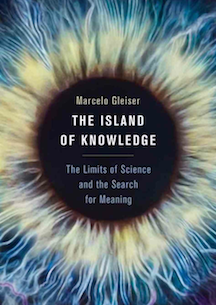By Amy Wray
In this book, Gleiser uses “The Island of Knowledge” as an allegory for the limits of science as a means of understanding reality. The shores of the island represent that which is known, and as the island grows with the advancement of technology, so grows the expanse of the shores that bound the island from the ocean of the unknown. This metaphor allows Gleiser to carefully – and at times, poetically – craft an approach to the mysteries of the unknowable that is, in his own words, “neither antiscientific nor defeatist.”
To build his argument, Gleiser delves into the history and philosophy of science starting with early religious explanations of natural phenomena, progressing through astronomy and quantum physics, and concluding with an examination of the nature of consciousness. Gleiser builds this historical walk-through of science with care, which is a necessary step for the establishment of his metaphor and central argument about the limitations of knowledge.
At times the pace may feel slow, such as during explanations of familiar concepts like Plato’s cave and Einstein’s theory of general relativity. However, these early investments maintain a level of accessibility, and the patient reader will find great rewards as the narrative builds to more complex topics in astronomy, physics, and mathematics. Throughout all sections of the book, these summaries illuminate science, philosophy, and religion as different – and not necessarily contradictory – ways of understanding reality.
The final chapter is a rewarding conclusion, and a refreshingly optimistic way of accepting that the advancements of science and technology will always be met with the infinite expanse of the unknowable. At this point, the previous chapters’ integrative approach to summarizing the history of science coalesces in a description of the beauty of the infinite expanses of the unknown. Gleiser emphasizes the benefits of accepting that the limits of scientific knowledge need not be a source of frustration, stating: “It is also good to remember that science only covers part of the Island, that there are many ways of knowing that can and should feed on one another.”
The eloquent final chapter could stand on its as a treatise of why scientific inquiry matters, and this is where the Island allegory strongly takes hold. The careful groundwork laid in middle chapters does not always directly contribute to this allegory, but nonetheless the book concludes an ambitious argument in an overall satisfying manner. The reader with a curious mind will be hard pressed to resist the allure of The Island of Knowledge.
Amy Wray is a graduate student at Columbia University in the master’s program in conservation biology, which is offered through the Department of Ecology, Evolution, and Environmental Biology. Columbia University is home to the Delta of New York Chapter of Phi Beta Kappa.




